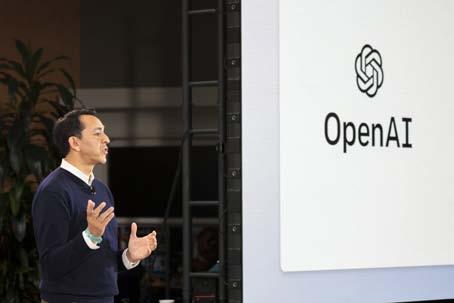
3 minute read
US and Taiwan conclude trade negotiations
WASHINGTON, USA—The United States and Taiwan have concluded negotiations on a trade agreement to deepen economic ties, amid growing tensions between Washington and Beijing.
“This accomplishment represents an important step forward in strengthening the US-Taiwan economic relationship,” US Trade Representative (USTR) Katherine Tai said in a statement on Thursday. The US-Taiwan Initiative on 21st-Century Trade looks to boost trade by streamlining customs checks, improving regulatory procedures, and establishing anticorruption measures between the United States and the self-governing island of Taiwan, which China has long claimed as part of its territory.
While the United States and Taiwan do not have official diplomatic relations, they do maintain unofficial ties through the de facto US embassy in the country, the American Institute in Taiwan.
Beijing has in recent years stepped up its threats and rhetoric against Taiwan, increasing military drills in the seas around the island and working to cut off its official ties with countries around the world.
The issue prompts rare bipartisan agreement in the United States, with politicians including Republican House Speaker Kevin McCarthy and his Democratic predecessor Nancy Pelosi both meeting publicly with Taiwanese leader Tsai Ing-wen over the last 12 months, drawing sharp criticism from China.
The first agreement under the initiative will allow American businesses “to bring more products to Taiwan and Taiwanese customers, while creating more transparent and streamlined regulatory procedures that can facilitate investment and economic opportunities in both markets, particularly for smalland medium-sized enterprises,” the statement said.
The agreement, which still needs to be signed by the two sides, will “deepen the trading partnership and enhance USTaiwan trade flows in order to promote innovation and inclusive economic growth for workers and businesses,” USTR said. AFP
Twitter says Microsoft broke developers rules
letter sent to Nadella.
Yusuf Mehdi, Microsoft corporate vice president of modern life, search and devices, speaks during a keynote address announcing ChatGPT integration for Bing at Microsoft in Redmond, Washington, on February 7, 2023. Microsoft’s long-struggling Bing search engine will integrate the powerful capabilities of language-based artificial intelligence, CEO Satya Nadella said, declaring what he called a new era for online search. AFP
SAN FRANCISCO, USA—ChatGPT, the artificial intelligence bot that became a global sensation for its powers to churn out human-like content and provide answers on all subjects, is now available in the Apple app store.
OpenAI, the Microsoft-backed company behind ChatGPT, on Thursday said the release came after it heard from users that they “love using ChatGPT on the go.”
By moving to smartphones, OpenAI continues its encroachment on the search market, massively dominated by Google, which has been put under pressure by the rise of generative AI.
Offered free of charge, the app will allow users to “get precise information without sifting through ads or multiple results,” OpenAI said on its website, in a subtle dig at Google’s search engine.
The app can also give “guidance on cooking, travel plans, or crafting thoughtful messages,” the company added.
OpenAI said it was starting the rollout in the United States and will expand to additional countries in the coming weeks. ChatGPT would be available on Android devices “soon,” it added.
ChatGPT’s powers are already available on smartphones, through Microsoft’s Bing search app, which uses technology from OpenAI.
The app store is also stocked with apps riding the wave of excitement around AI. Facebook_owner Meta last month warned of malicious software posing as ChatGPT or similar AI tools. AFP
SAN FRANCISCO, USA—Twitter on Thursday accused Microsoft of breaking the social network’s rules for developers who access the platform’s data, according to a copy of a letter seen by AFP.
“Microsoft may have been in violation of multiple provisions of the Agreement for an extended period of time,” read the letter signed by Musk attorney Alex Spiro and sent to Microsoft chief executive Satya Nadella.
Microsoft stopped accessing Twitter data in April, opting not to pay fees Musk demanded developers pay for APIs (application programming interfaces) that engage with the platform, according to the letter.
Twitter called on Microsoft to identify all Twitter content that has been in its control during the past two years; how it is stored and what has been done with it, according to the
Microsoft confirmed receiving a letter from a law firm representing Twitter with some questions about its previous use of the free Twitter API.
“We will review these questions and respond appropriately,” a Microsoft spokesperson said in response to an AFP inquiry. “We look forward to continuing our long-term partnership with the company.”
Twitter said in the letter it is looking into whether Microsoft exceeded the “reasonable request volume” in what could constitute “abusive usage.”
Twitter wants the information by June 7, the letter stated.
The demand comes as Elon Musk looks to generate revenue by getting developers to pay for Twitter platform access that had been free prior to the billionaire taking over.
Musk is also out to counter Microsoft and Google with his recently-established X.AI artificial intelligence corporation based in the US state of Nevada, according to business documents. Musk last month fired of a Tweet accusing Microsoft of illegally using Twitter data to train artificial intelligence, writing “lawsuit time.” Big tech companies like Google, Meta and Microsoft have spent years working on AI systems -- previously known as machine learning or big data -- to help with translations, search, and targeted advertising. Microsoft is investing billions of dollars in ChatGPT creator OpenAI and has put its technology to work in its Bing internet search service.
Since taking over Twitter in late October, Musk has repeatedly courted controversy, sacking most of its staff readmitting far-right figures to the platform, suspending journalists, and charging for previously free services.








